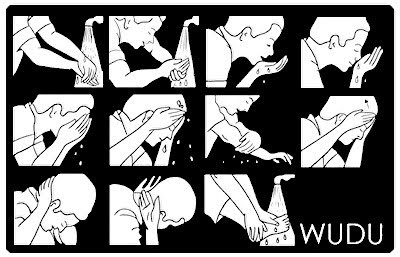 Before offering a prayer, Muslims perform a ritual washing known as ablution or Wudhu. This process ensures that their body is clean and pure for worship.
Before offering a prayer, Muslims perform a ritual washing known as ablution or Wudhu. This process ensures that their body is clean and pure for worship.
Steps to Perform Wudhu (Ablution) for Prayer
- Intention (Niyyah): Begin with the intention in your heart for performing Wudhu for the purpose of worship.
- Istinja: Cleanse the private parts thoroughly.
- Washing Hands: Start by washing both hands up to the wrists three times while saying “Bismillah” (In the name of Allah).
- Rinsing the Mouth: Take water into your mouth and rinse it thoroughly, ensuring it reaches the throat. Repeat this three times.
- Cleaning the Nostrils: Sniff water into your nostrils to clean them and then blow it out. Do this three times.
- Washing the Face: Wash your face from the forehead to the chin and from ear to ear with both hands, three times.
- Washing the Arms: Wash your right arm up to the elbow three times, then repeat the same for the left arm.
- Wiping the Head (Masah): Wipe your head with wet hands once, ensuring that your hands pass over the entire head or a part of it.
- Cleaning the Ears: Wipe the inner parts of your ears with your forefingers and the outer parts with your thumbs using wet fingers.
- Washing the Feet: Wash your feet up to the ankles three times, starting with the right foot, then the left.

After completing these steps, your Wudhu is complete, and you are ready to perform your prayers or worship. This state of cleanliness can be maintained for an extended period unless nullified.
Actions That Nullify Wudhu
Wudhu is nullified by the following actions, necessitating a fresh ablution before the next prayer or act of worship:
- Natural Bodily Functions: Passing gas, urination, or defecation.
- Flowing Blood: Blood that flows from any part of the body.
- Vomiting: Significant vomiting that involves regurgitation of food or liquid.
- Sleep: Falling into a deep sleep where you lose awareness.
- Intoxicants: Consumption of intoxicating substances.
Additional Notes
- After Natural Discharge: After passing gas or using the toilet, it is recommended to cleanse the area with water or tissues before performing Wudhu again.
- Continuity: If any step is missed or performed incorrectly, it is advised to repeat the Wudhu to ensure purity.
By adhering to these guidelines, Muslims can ensure their Wudhu is performed correctly, maintaining the purity required for prayers and the recitation of the Holy Quran.



